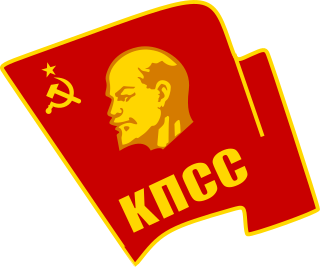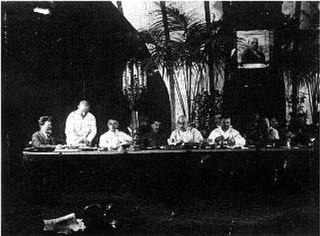The Politburo of the 28th Congress of the Communist Party of the Soviet Union was in session from 1990 to 1991.
The Politburo of the 15th Congress of the All-Union Communist Party (Bolsheviks) was in session from 1927 to 1930.

The Politburo of the 14th Congress of the All-Union Communist Party (Bolsheviks) was in session from 1 January 1926 to 19 December 1927.
The Politburo of the 13th Congress of the All-Union Communist Party (Bolsheviks) was in session from 2 June 1924 to 1 January 1926.

The Politburo of the 12th Congress of the Russian Communist Party (Bolsheviks) was in session from 26 April 1923 to 2 June 1924.

The Politburo of the 11th Congress of the Russian Communist Party (Bolsheviks) was in session from 2 April 1922 to 25 April 1923.
The Central Committee (CC) composition was elected by the 8th Congress, and sat from 23 March 1919 until 5 April 1920. The CC 1st Plenary Session renewed the composition of the Politburo, Secretariat and the Organizational Bureau (OB) of the Russian Communist Party (Bolsheviks).

The Central Committee (CC) composition was elected by the 9th Congress, and sat from 5 April 1920 until 16 March 1921. The CC 1st Plenary Session renewed the composition of the Politburo, Secretariat and the Organizational Bureau (OB) of the Russian Communist Party (Bolsheviks).

The Politburo of the 10th Congress of the Russian Communist Party (Bolsheviks) was in session from 16 March 1921 to 3 April 1922.
The Central Committee (CC) composition was elected by the 7th Congress, and sat from 8 March 1918 until 23 March 1919. The CC 1st Plenary Session renewed the composition of the Bureau, Secretariat and the Organizational Bureau (OB) of the Russian Communist Party (Bolsheviks).

The Central Committee (CC) composition was elected by the 10th Congress, and sat from 16 March 1921 until 2 April 1922. The CC 1st Plenary Session renewed the composition of the Politburo, Secretariat and the Organizational Bureau (OB) of the Russian Communist Party (Bolsheviks).

The Central Committee (CC) composition was elected by the 11th Congress, and sat from 2 April 1922 until 25 April 1923 . The CC 1st Plenary Session renewed the composition of the Politburo, Secretariat and the Organizational Bureau (OB) of the Russian Communist Party (Bolsheviks).
The Central Committee (CC) composition was elected by the 6th Congress, and sat from 3 August 1917 until 8 March 1918. The CC 1st Plenary Session established the Narrow Composition (abolished October 1917), the Politburo (abolished November 1917) and the Bureau (established in November 1917), while sanctioning the establishment of the Secretariat on the orders of the Narrow Composition.

The Central Committee (CC) composition was elected by the 12th Congress, and sat from 25 April 1923 until 31 May 1924. The CC 1st Plenary Session renewed the composition of the Politburo, Secretariat and the Organizational Bureau (OB) of the Russian Communist Party (Bolsheviks).

The Central Committee (CC) composition was elected by the 13th Congress, and sat from 2 June 1924 until 31 December 1925. The CC 1st Plenary Session renewed the composition of the Politburo, Secretariat and the Organizational Bureau (OB) of the All-Union Communist Party (Bolsheviks).
The Central Committee (CC) composition was elected by the 14th Congress, and sat from 31 December 1925 until 19 December 1927. The CC 1st Plenary Session renewed the composition of the Politburo, Secretariat and the Organizational Bureau (OB) of the All-Union Communist Party (Bolsheviks).

The Central Committee (CC) composition was elected by the 15th Congress, and sat from 19 December 1927 until 13 July 1930. The CC 1st Plenary Session renewed the composition of the Politburo, Secretariat and the Organizational Bureau (OB) of the All-Union Communist Party (Bolsheviks).
The Central Committee (CC) composition was elected by the 16th Congress, and sat from 13 July 1930 until 10 February 1934. Its 1st Plenary Session elected the Politburo, Secretariat and Orgburo. The 16th Congress was the first party convention since the 13th Congress which saw no organized opposition, and the first congress in party history in which there was no opposition to the party leadership. Ukrainian historian Oleg Khlevniuk considers the period 1930–1934 to be a "transitional period" between collective leadership (referred to interchangeably by him as oligarchy) and Joseph Stalin's personal dictatorship (autocracy). The removal of Alexei Rykov, the Chairman of the Council of People's Commissars (SNK, the Soviet government), from the Politburo at the 1st Joint Plenary Session of the CC and the Central Control Commission (CCC) has been marked in historic literature as "the definitive Stalinization of that body [Politburo]" according to Khlevniuk.

The Politburo of the 16th Congress of the All-Union Communist Party (Bolsheviks) was in session from 1930 to 1934.

The Politburo of the 17th Congress of the All-Union Communist Party (Bolsheviks) was in session from 1934 to 1939.






